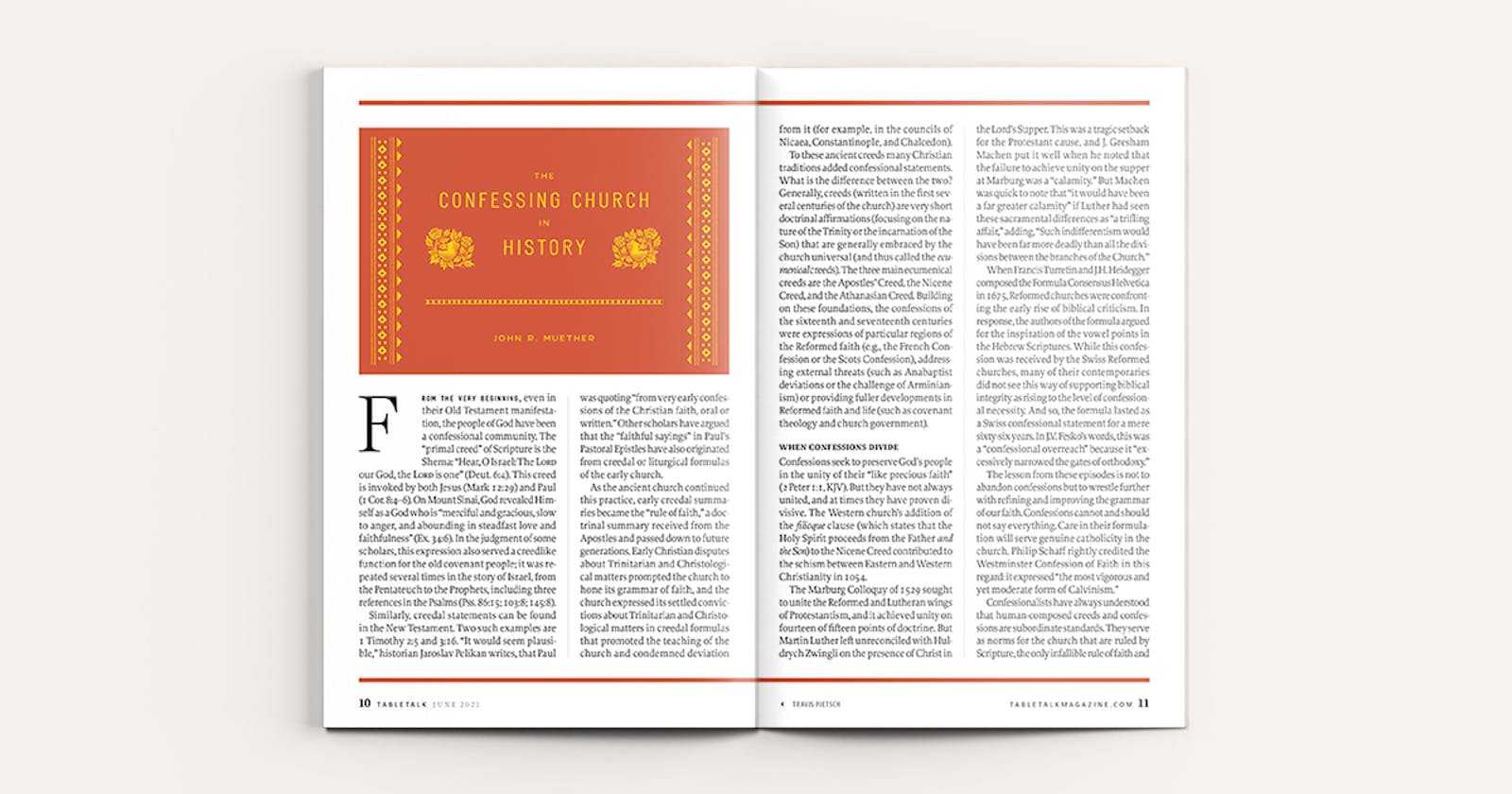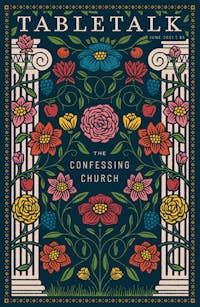
Request your free, three-month trial to Tabletalk magazine. You’ll receive the print issue monthly and gain immediate digital access to decades of archives. This trial is risk-free. No credit card required.
Try Tabletalk NowAlready receive Tabletalk magazine every month?
Verify your email address to gain unlimited access.
From the very beginning, even in their Old Testament manifestation, the people of God have been a confessional community. The “primal creed” of Scripture is the Shema: “Hear, O Israel: The LORD our God, the LORD is one” (Deut. 6:4). This creed is invoked by both Jesus (Mark 12:29) and Paul (1 Cor. 8:4–6). On Mount Sinai, God revealed Himself as a God who is “merciful and gracious, slow to anger, and abounding in steadfast love and faithfulness” (Ex. 34:6). In the judgment of some scholars, this expression also served a creedlike function for the old covenant people; it was repeated several times in the story of Israel, from the Pentateuch to the Prophets, including three references in the Psalms (Pss. 86:15; 103:8; 145:8).
Similarly, creedal statements can be found in the New Testament. Two such examples are 1 Timothy 2:5 and 3:16. “It would seem plausible,” historian Jaroslav Pelikan writes, that Paul was quoting “from very early confessions of the Christian faith, oral or written.” Other scholars have argued that the “faithful sayings” in Paul’s Pastoral Epistles have also originated from creedal or liturgical formulas of the early church.
As the ancient church continued this practice, early creedal summaries became the “rule of faith,” a doctrinal summary received from the Apostles and passed down to future generations. Early Christian disputes about Trinitarian and Christological matters prompted the church to hone its grammar of faith, and the church expressed its settled convictions about Trinitarian and Christological matters in creedal formulas that promoted the teaching of the church and condemned deviation from it (for example, in the councils of Nicaea, Constantinople, and Chalcedon).
To these ancient creeds many Christian traditions added confessional statements. What is the difference between the two? Generally, creeds (written in the first several centuries of the church) are very short doctrinal affirmations (focusing on the nature of the Trinity or the incarnation of the Son) that are generally embraced by the church universal (and thus called the ecumenical creeds). The three main ecumenical creeds are the Apostles’ Creed, the Nicene Creed, and the Athanasian Creed. Building on these foundations, the confessions of the sixteenth and seventeenth centuries were expressions of particular regions of the Reformed faith (e.g., the French Confession or the Scots Confession), addressing external threats (such as Anabaptist deviations or the challenge of Arminianism) or providing fuller developments in Reformed faith and life (such as covenant theology and church government).
when confessions divide
Confessions seek to preserve God’s people in the unity of their “like precious faith” (2 Peter 1:1, KJV). But they have not always united, and at times they have proven divisive. The Western church’s addition of the filioque clause (which states that the Holy Spirit proceeds from the Father and the Son) to the Nicene Creed contributed to the schism between Eastern and Western Christianity in 1054.
The Marburg Colloquy of 1529 sought to unite the Reformed and Lutheran wings of Protestantism, and it achieved unity on fourteen of fifteen points of doctrine. But Martin Luther left unreconciled with Huldrych Zwingli on the presence of Christ in the Lord’s Supper. This was a tragic setback for the Protestant cause, and J. Gresham Machen put it well when he noted that the failure to achieve unity on the supper at Marburg was a “calamity.” But Machen was quick to note that “it would have been a far greater calamity” if Luther had seen these sacramental differences as “a trifling affair,” adding, “Such indifferentism would have been far more deadly than all the divisions between the branches of the Church.”
When Francis Turretin and J.H. Heidegger composed the Formula Consensus Helvetica in 1675, Reformed churches were confronting the early rise of biblical criticism. In response, the authors of the formula argued for the inspiration of the vowel points in the Hebrew Scriptures. While this confession was received by the Swiss Reformed churches, many of their contemporaries did not see this way of supporting biblical integrity as rising to the level of confessional necessity. And so, the formula lasted as a Swiss confessional statement for a mere sixty-six years. In J.V. Fesko’s words, this was a “confessional overreach” because it “excessively narrowed the gates of orthodoxy.”
The lesson from these episodes is not to abandon confessions but to wrestle further with refining and improving the grammar of our faith. Confessions cannot and should not say everything. Care in their formulation will serve genuine catholicity in the church. Philip Schaff rightly credited the Westminster Confession of Faith in this regard: it expressed “the most vigorous and yet moderate form of Calvinism.”
Confessionalists have always understood that human-composed creeds and confessions are subordinate standards. They serve as norms for the church that are ruled by Scripture, the only infallible rule of faith and practice. Thus, confessions can be revised on occasions when the church can bring the Scriptures to bear for greater insight. For example, the American Presbyterian revisions of the Westminster Confession in 1789 clarified the independence of the church from the state. But confessional revision is rare, and properly so. When it happens, it often accommodates the spirit of the age and weakens the church’s Reformed testimony. Such was the case in the 1903 revisions by Northern Presbyterians who softened Westminster’s teaching on human depravity and election.
confessional discontent
Today, the church looks back at its confessional history with considerable skepticism. Interest in confessions is waning, and their influence over the grammar of faith is diminishing. Suspicion is particularly cast on the claim that confessions can genuinely unite. One can have confessions or one can have catholicity, but not both—this seems to be the prevailing spirit.
The history of American Presbyterianism, divided into the “split P’s” of many denominations, might appear to offer support for that argument. More than a century ago, B.B. Warfield conceded that there was “widespread agitation” over confessions among Presbyterians of his day. He traced it to several causes. One source of discontent was the overexacting terms of subscription (that is, the vow that officers must take to uphold the confessional standards). Warfield championed the practice (established in Colonial American Presbyterianism) of requiring ministers and elders to subscribe to the Westminster Standards as containing the “system of doctrine” found in Scripture. This freed ministers from commitment to the exact words of the confession, granting liberty to modify some of its propositions. “Strict” confessional subscription “overreaches itself,” Warfield asserted, and he went on to claim that “overstrictness demands and begets laxity in performance” and often serves to erode practical confessionalism. In the words of Charles Hodge, “The overstrict the world over are the least faithful.”

Discontent often arises from a thin notion of catholicity. If we minimize the confessions of our churches, wouldn’t a larger united church emerge? Wouldn’t a brief and generically evangelical statement of faith attract the greatest interest? Warfield argued that this approach was like “building a great house around a divided family.” The unity of the church never comes at the expense of its maturity in the faith. “We should consider well,” he adds, “whether this liberal pathway leads not in the end to tyranny.”
what confessions do
These expressions of confessional disaffection underscore the widespread confusion in our day about the nature and purpose of church confessions. Again, Warfield is helpful here. He observed that confessions, rightly employed, provide three services to the church: they are tests, texts, and testimonies.
Confessions are tests when candidates are examined for church leadership. They form the basis of a church’s confidence of one’s fitness for office. This test binds the candidate’s faith—can he vow ex animo (from the heart) and will he commit himself to teach what the Bible reveals about, for example, the federal headship of Adam or the virgin birth of Christ?
Confessions are texts when they instruct the faithful in theology. Catechisms (confessional statements in question and answer form) are especially effective discipleship tools. Often based on the Apostles’ Creed, the Lord’s Prayer, and the Ten Commandments, they provide the means of training both the young and old in the Christian faith. Churches weaken their confessional identity when they neglect their duty to perfect the saints through catechesis.
Confessions are testimonies when they are the declarations of the faith of the church. This function includes the church’s corporate witness to a watching world and to other Christian churches, but it is especially seen when the church offers corporate praises and thanksgiving to God in its liturgical life. This entails the regular reading or reciting of portions of confessions in worship, but that is not all. The church’s confessions should shape the hymnody of the church. Public worship requires congregational song. When that is replaced by special music by professional performers, the church has robbed its flock of the privilege of confessing its faith. Moreover, the song of the church cannot be reduced to expressions of individual experience. The testimony of the church should not be “I Surrender” but rather “We Praise You Our God, Our Redeemer, Creator.” It is a hollow confession of faith whose theologically rich grammar does not shape the character of the church’s praise.
Tests, texts, and testimonies—these functions allow confessions to serve as the backbone for the confessing church, and they turn the argument about confessions and unity on its head. Far from undermining the cause of catholicity, confessions serve it. More often than not, Presbyterian splits have resulted from a departure from confessional fidelity. Without confessions, churches are tossed about by every wind of doctrine, disconnected from others by idiosyncratic interpretations and untethered from the Reformed tradition by fleeting concerns.
confessions as wide places
In Psalm 18, David praises God for setting him in a broad place (v. 19) and a wide place (v. 36), language that is found elsewhere in the Old Testament. What is this broad place? Often associated with the promised land, it is a place of safety, freedom, and prosperity.
Confessional churches are often viewed as narrow places, where tightly held doctrines allow little deviation, leading some to fear a theological claustrophobia of tyrannical uniformitarianism. To be sure, confessions can be and have been misused. They can be reduced to hammers to enforce rigid uniformity in church courts.
But confessions in the history of the church reveal a different story. They can be a gift through which the church is called to maintain eager and cordial unity among its members and fellowship with the broader church. In Richard Muller’s words, a confession “provides boundaries for theological and religious expression, but it also offers considerable latitude for the development of varied theological and religious expression within those boundaries.” The greatest seasons of theological prosperity in the Reformed tradition have been characterized by heightened attention to its confessions. Far from being an impediment to the flourishing of the church, creeds and confessions are vital to the church’s unity, holiness, Apostolicity, and catholicity.
